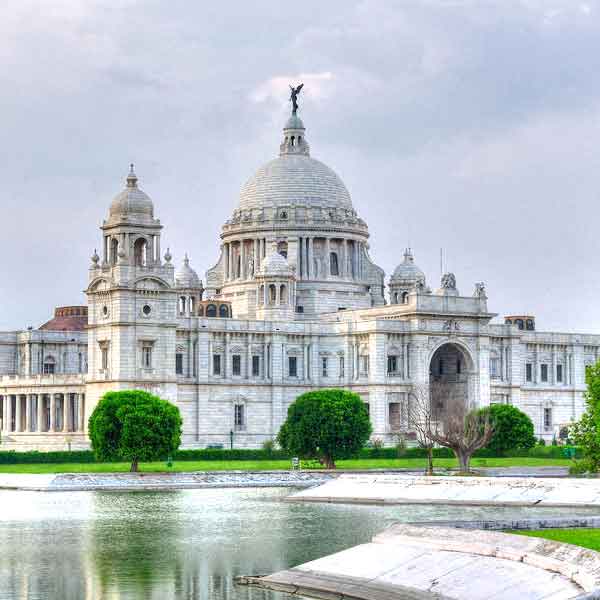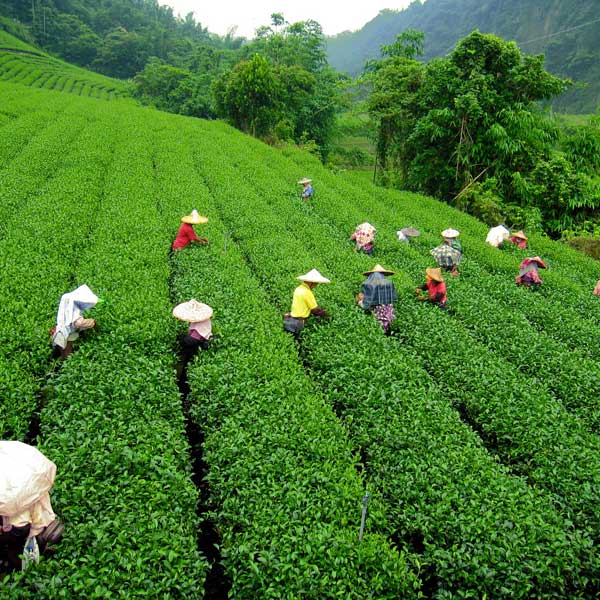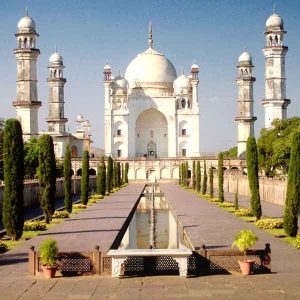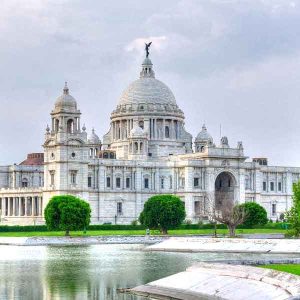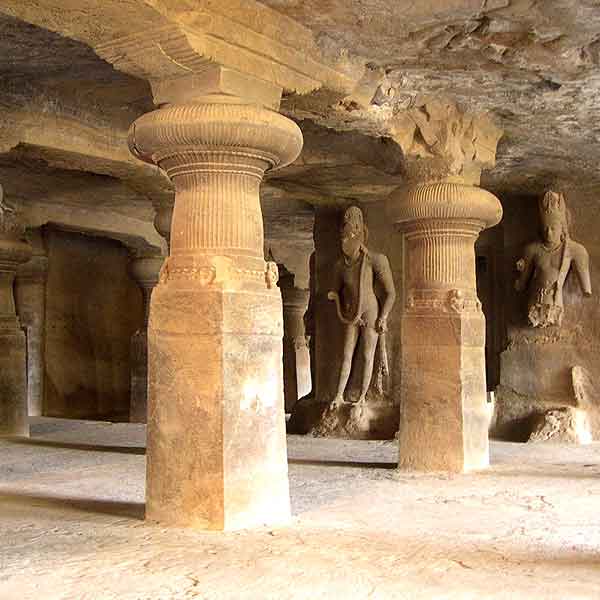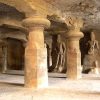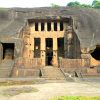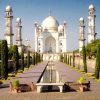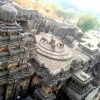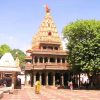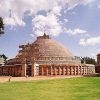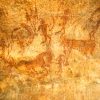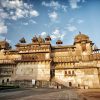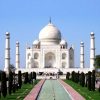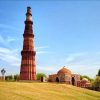Day 01: Arrive in Mumbai.
Arrive Mumbai International Airport where you are met by our representative and transferred to the hotel. Rest of the day at leisure. Overnight at hotel.
Day 02: Mumbai.
Morning transfer to Gateway of India to board the boat for an excursion to Elephanta Caves (World Heritage Site).
Elephanta Caves : The celebrated cave on the island excavated from a cliff high above the water during the Golden age of the Gupta’s the worshipers of Lord Shiva derives its name from a stone elephant carved in here. Sculptures in caves are beautifully executed and most outstanding of them is the “Trimurthy”, a three headed bust hewn from a single rock representing the trinity viz. Lord Bramha the Creator, Lord Vishnu the Preserver and Lord Shiva the Destroyer.
Afternoon city tour of Mumbai includes visit to Prince of Wales Museum (Monday closed) magnificent heritage building built in 1909 is an exquisite example of the Indo-Saracenic architecture. The Museum is expanded into various sections, including the Maritime Heritage gallery, the first of its kind in India.
Watch washermen in action at “Dhobighat”- the unique and colourful outdoor laundry. Drive to the Malabar hill to visit lovely Hanging Gardens and Kamla Nehru Park which commands a wonderful view of Mumbai and the Arabian Sea spread out before.
Overnight in Mumbai.
Day 03: Mumbai (Day return excursion to Kanheri Caves).
Morning proceed on an excursion to Kanheri Caves that dates back to 2nd – 9th centuries and are found to have been carved out by Buddhist monks. Situated at the centre of Mumbai’s Borivali National Park, the Kanheri caves are one of the biggest Buddhist monastic establishments on the Konkan coast.
Return to Mumbai in the afternoon with rest of the day at leisure or free for optional activities. Overnight in Mumbai.
Day 04: Mumbai to Pune (163 Km).
Morning depart Mumbai by surface for Pune stopping by en route to visit Karla & Bhaja Caves. Karla and Bhaja Caves dating back to the 2nd Century BC are one of the best Buddhist Cave monasteries. The magnificent Chaitya or the hall of prayer at Karla is the largest one of its kind. Three unique features of the interior these caves are their pillars, roof vault and the light windows. Arrive Pune and check in at hotel with rest of the Day at leisure or free for optional activities.
Day 05: Pune to Aurangabad (226 Km).
Morning depart Pune by surface for Aurangabad. Arrive Aurangabad and check into the hotel.
Afternoon visit Bibi-ka-Maqbara built by Prince Azam Shah, son of Emperor Aurangzeb, one of the Mughal Emperors, in the late 17th century as a loving tribute to his mother, Rabia Durrani alias Dilras Banu Begum. This mausoleum is a replica of the famous Taj Mahal. Bibi Ka Maqbara is an architectural wonder with intricate designs, carved motifs, imposing structure and beautifully landscaped Moghal-style garden. The walk from the entrance to the monument is dotted with lush lawns, deep green cypresses and gurgling fountains. The pavements leading to the mausoleum are flanked by oblong reservoirs. The ambience is overwhelmingly that of the Taj Mahal. Overnight in Aurangabad.
Day 06: Aurangabad (Day return excursion to Ajanta).
Full Day excursion to Ajanta Caves “A World Heritage Site” (Closed to visitors on Mondays) – nestled in panoramic gorge of Sahyadri hills about 107 km from Aurangabad city, the Caves of Ajanta are the finest examples of some of the earliest Buddhist architecture, cave paintings and sculptures. The caves comprise of Chaitya or prayer halls and monasteries dedicated to Lord Buddha which were used by Buddhist monks for meditation and the study of Buddhist teachings. The murals on the walls and ceilings of the Caves depict incidents from the life of the Buddha, Jataka tales, illustrating diverse stories relating to the previous incarnations of the Buddha as Boddhisatava, a saintly being who is destined to become the Buddha. Overnight in Aurangabad.
Day 07: Aurangabad (Day return excursion to Ellora).
Morning proceed on an excursion to Ellora Caves “A World Heritage Site” (Closed to visitors on Tuesday) – the cave temples and monasteries at Ellora, excavated out of the vertical face of an escarpment contain Buddhist monasteries, prayer halls, Hindu and Jai temples. Carved between the 5th and 11th century AD, the earliest excavation here is of the Dhumar Lena. Kailash Temple at Cave 19 largest monolithic structure in the world is the most imposing excavation without doubt. Overnight in Aurangabad.
Day 08: Aurangabad to Indore (380 Km).
Morning depart Aurangabad by surface for Indore. Arrive Indore and check in hotel with rest of day at leisure or free for optional activities. Overnight in Indore.
Day 09: Indore to Bhopal via Ujjain (245 Km).
Morning depart Indore for Bhopal visiting Ujjain en route. Situated on the banks of the river Shipra, Ujjain is the one of the sacred place for Hindu pilgrimage. It is believed that mythological tale search of immortal nectar took place here and one of the four drops which spilled from the jar fell on Ujjain. Thus Maha Kumb takes place in Ujjain every 12 years. Ujjain has a great tradition of learning and culture. It was used as the base for calculations of Hindu astronomy, astrology and geography.
Visit the Temple of Mahakaleshwar, Observatory of masonry, Jantar Mantar, Bathing Ghats of Shipra river and the Gopal Mandir, a 19th century temple of Maratha-Style architecture.
Arrive Bhopal and check in at hotel with rest of the day at leisure or free for optional activities.
Day 10: Bhopal (Day return excursion to Sanchi & Bhimbetka).
Sanchi (World Heritage Site) – Sanchi is on the finest specimens of almost all Buddhist architectural forms. Known for its Stupas, monasteries, temples and pillars dating from the 3rd century B.C. to the 12th century A.D, the most famous of them is Sanchi Stupa 1 originally built by the Mauryan Emperor Ashoka. Also visit Ashoka Pillar.
Bhimbetka (World Heritage Site) – Located in the northern fringe of the Vindhyan ranges at Bhimbetka lies over 600 Neolithic age rock shelters where one can witness vivid panoramic detail, paintings describing life of the pre-historic cave-dwellers providing an invaluable chronicle in the history of man. Murals depicts activities of every day life such as hunting, dancing, music, horse and elephant riders, animals fighting, honey collection, decoration of bodies, disguises, masking and household scenes, popular religious and ritual symbols etc. Animal figures appearing in some such as bison, tiger, lion, wild boar, elephant, antelope, dog, lizards, crocodile, etc. in some caves also contributes in providing information in natural history.
Return to Bhopal by late afternoon with rest of the day at leisure or free for optional activities.
Day 11: Bhopal to Orchha via Jhansi.
Morning drive along the upper lake and visit some import sites in Bhopal. Afternoon transfer to railway station to board the train Shatabdi Express for Jhansi. Arrive Jhansi and transfer to Orchha (30 km). Overnight in Orchha.
Day 12: Orchha to Khajuraho (140 Km).
Orchha’s grandeur has been captured in stone, frozen in time, a rich legacy to the ages. In this medieval city, the hand of time has rested lightly and the palaces and temples built by its Bundela rulers in the 16th and 17th centuries retain much of their pristine perfection. Morning visit Orchha Palace and royal cenotaphs that line along the bank of Betwa river.
Afternoon depart for Khajuraho and check into the hotel on arrival. In the evening witness a magnificent sound and light show a on the temples of Khajuraho with tales of Khajuraho. Overnight in Khajuraho.
Days 13: Khajuraho.
Full day exploration of the western and eastern group of temples. Khajuraho occupies a unique place in the temple architecture of India. Thousand years old intricately carved 85 temples built in short span of 100 years, from 950 AD – 1050 AD only 22 stand today. Erotic carvings are another very important features of Khajuraho temples. Also, visit newly excavated 10th century Chandela temple. Overnight in Khajuraho.
Day 14: Khajuraho to Agra via Jhansi.
After a leisurely morning depart Khajuraho by surface for Jhansi to connect train Shatabdi Express for Agra. Arrive Agra in the evening and check in at hotel. Overnight in Agra.
Day 15: Agra to Delhi.
Morning excursion (44 km one way) to the deserted capital of Fatehpur Sikri, which served as capital of Mughal dynasty during the reign of Emperor Akbar for a brief while till it was quickly abandoned due to lack of potable water.
Afternoon visit Agra Red Fort from where four of the mighty ruler of Mughal dynasty ruled their vast empire and the most beautiful monument of love the Taj Mahal, which is flawless to its conception and execution. Stay on to view the monument in the soft light of the setting sun.
Later in the evening transfer to railway station to board the train Shatabdi Express for Delhi. Arrive Delhi and transfer to hotel.
Day 16: Delhi. Depart Delhi.
Full day combined sightseeing tour of Old and New Delhi – visiting Qutab Minar one of the tallest tower of it’s time, Humayun’s Tomb one of the forerunner of the Taj Mahal, drive past India Gate and President House and other government buildings, Red Fort symbol of mighty Mughal empire, Jama Masjid one of the biggest mosque in India, Chandni Chowk and Raj Ghat (Mahatma Gandhi Memorial).
Late evening transfer to international airport to board the flight for onward destination.
Date and price to suit individual arrangements based on 2 people sharing. Breakfast included. Private air-conditioned car and driver with English speaking guides for sightseeing.

